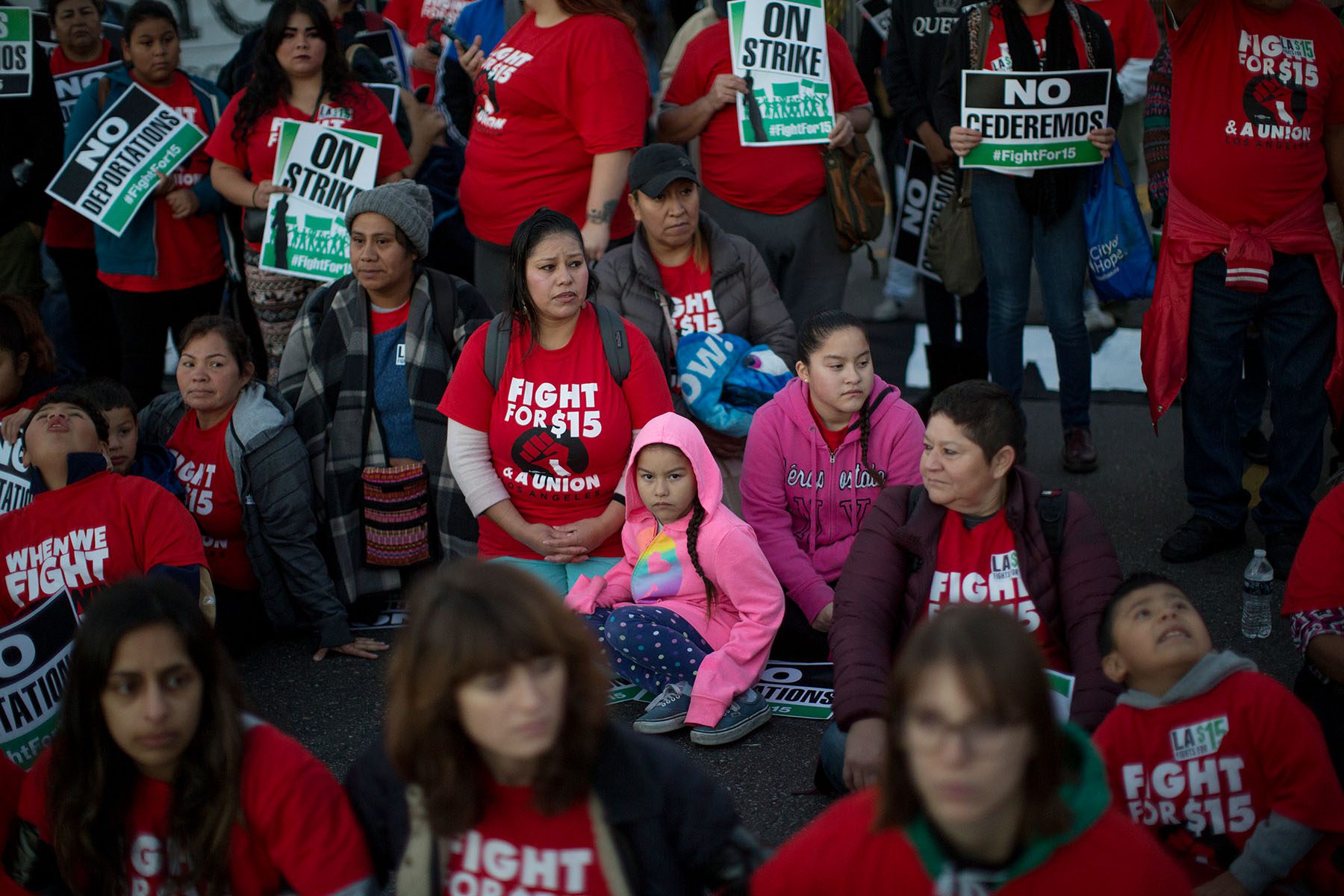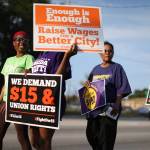In most of the United States, the majority of women of color are still working a low-wage job — a legacy of decades of discriminatory policies that have stymied women’s economic growth.
A new state-by-state analysis of U.S. Census Bureau data released Tuesday by Oxfam, a global anti-poverty organization, shows how deep and widespread those disparities still are.
In nine states, 50 percent or more of all women workers are earning less than $15 an hour. But in 40 states, 50 percent or more of all women of color — Black women, Latinas, Native American women and Asian American and Pacific Islander women — are earning below a living wage. In 23 states, 60 percent or more of all women of color have hourly earnings under $15. The data reflects full-time workers and includes tipped workers and gig workers.
The $15 an hour measure has for the past several years been considered the starting point for a fair living wage — how much workers need to earn to afford a basic but decent lifestyle that allows them to save money and cover basic needs. It’s a different measure than the minimum wage, which has remained at $7.25 in the United States since 2009, making this the longest period the country has gone without raising the wage since it was created in the 1930s.
Oxfam’s analysis looked at how state-level decisions have driven women of color into poverty. In Mississippi, the only state that doesn’t have its own law requiring equal pay for all genders, 70 percent of all women of color are earning under the living wage, the highest of any state. Washington, D.C., which has its own minimum wage law with a current minimum at $15.20, has the lowest share of women of color earning below $15 an hour: 17 percent.
Minimum wages have a history of exclusion in the United States. When the Fair Labor Standards Act was designed in 1938, farm workers, domestic workers and restaurant workers were excluded from its minimum wage protections as a way to pay Black workers less. That created the tipped wage, which still exists and allows restaurants to pay employees $2.13 with the expectation that tips will bring them up to the minimum wage. The tipped wage has not risen in 30 years.
Over time, many exclusionary policies have been eliminated, but some, like the tipped wage, the subminimum wage for workers with disabilities and exclusions for some home care workers who provide companionship services, remain. Much of those jobs continue to be performed by women of color, leading the minimum wage to become an issue of gender and racial equity, said Kaitlyn Henderson, a senior researcher at Oxfam America and the author of the report.
“When there was, codified in law, an undervaluing of the work of women of color, that does not easily go away,” she said. “And so the echoes, the reverberations of that undervaluing continue to this day.”
Overall, about 40 percent of all working women and 50 percent of women of color are earning less than $15 an hour, Oxfam found. Among single parents, most of whom are women, 58 percent earn less than a living wage.
During the pandemic, that reality has made it more difficult for women of color to regain jobs, both because low-wage jobs were the most vulnerable to closures and because they provide fewer worker protections such as paid sick leave. In February, Black women’s unemployment rate went up while rates were going down for all other groups. The rate was 6.1 percent — almost twice White women’s rate of 3.1 percent. Latinas’ unemployment rate was 4.8 percent.
Tipped workers suffered in particular. If workers are still not earning minimum wage after tips, employers are required to make up any missing wages. But wage theft has run rampant. A survey in August and September 2021 by One Fair Wage, a group working to eliminate the tipped wage, found that 35 percent of tipped workers surveyed said their employer was not making up their wages after tips to help them reach their state’s minimum wage.
Those challenges helped revive discussions during the pandemic of raising the federal minimum wage to $15 an hour — a campaign promise made by President Joe Biden — but so far legislation to gradually raise the wage and eliminate the tipped wage has not advanced. After a push to include it in the coronavirus stimulus package, the American Rescue Plan, it was ultimately left out.
Instead, Biden raised the minimum wage for federal workers and contractors to $15 an hour, which went into effect in January. At his State of the Union address in March, the president reiterated his desire to pass a $15 federal minimum wage and an extension of the child tax credit, which last year was expanded temporarily to send direct cash payments to the lowest-income families with children, “so no one has to raise a family in poverty,” he said. The White House did not respond to a request for comment on any further negotiations the president has had on the minimum wage this year.
Most of the momentum toward $15 has happened in states. Ten states and D.C. have a $15 minimum wage law in the books, including most recently in Florida, which passed a tiered increase through a ballot measure in 2020 that would reach $15 in 2026. About 61 percent of Florida voters supported it.
But already, the $15 minimum wage is soon to be less than what most workers need to sustain themselves. According to a new family budget calculator by the Economic Policy Institute, a progressive think tank, a full-time worker in the U.S. county with the lowest cost of living, Orangeburg in South Carolina, would need to earn $14.50 an hour.
The $15 minimum “does not solve all problems, but this is a solution that already exists that Congress can pass tomorrow,” Henderson said. “We are not seeing Congress get behind it.”
Business owners have argued that a $15 minimum wage requirement could put them out of business, and opponents of a federal wage believe a state-by-state approach more accurately captures the variations in cost of living.
Henderson said a $15 federal minimum wage could set a floor that states could then build on. The pandemic and historic inflation has already caused employers, including Chipotle, Walgreens and Starbucks, to voluntarily raise their minimum wages to compete for workers in what has become a tight labor market.
All of those changes have been part of a growing movement to enact better policies that support women, who are also the majority of essential workers and frontline workers, in a workforce that has lacked key labor protections for years, including paid leave, child care and pay discrimination protections.
“The way that we value women's work, and especially sectors that are disproportionately represented by women of color, is not just how we don't pay them enough,” Henderson said. “It's all the ways that we don't treat them with dignity and respect.”







